Sidetracks and Detours present PASS IT ON 40 Sunday Supplement 18 2 2024
Sidetracks and Detours
present
PASS IT ON 40
Sunday Supplement 18 2 2024
Hello and thanks for opening the pages of our weekly walkabout Sunday Supplement. We are confident you really will want to PASS IT ON and share it with your like minded arts loving friends. We are grateful for this week´s live jazz listings, and for the on air Hot Biscuits fare, served with jazz. We thought that would make an interesting compare and contrast exercise with both the live Music In Portsmouth with this week´s choice of Remembered Music. There is also a poignant story about a songwriter much appreciated by the Americana scene and our Island Insights this week take us all the way back to Phoenix Nights in Rochdale. So, thanks for again for joining us and we´ll no doubt see you round the corner somewhere.

CONTENTS

live jazz
FORTHCOMING EVENT
Jo Harrop ‘Mother’s Day Special’
Jazz On Air
HOT BISCUITS
delivered to your home by Steve Bewick
Music in Porstmouth
Live Music
CLARINET QUARTET,
Remembered Music
AL BOWLLEY´S DEAD
by Ralph Dent
A Reader´s Perspective: All Points Forward
TEN SONGS by Ben Bullington
a profile by Peter Pearson
Island Insights
AJ the DJ enjoys PHOENIX NIGHTS
by Norman Warwick


live jazz
FORTHCOMING EVENT
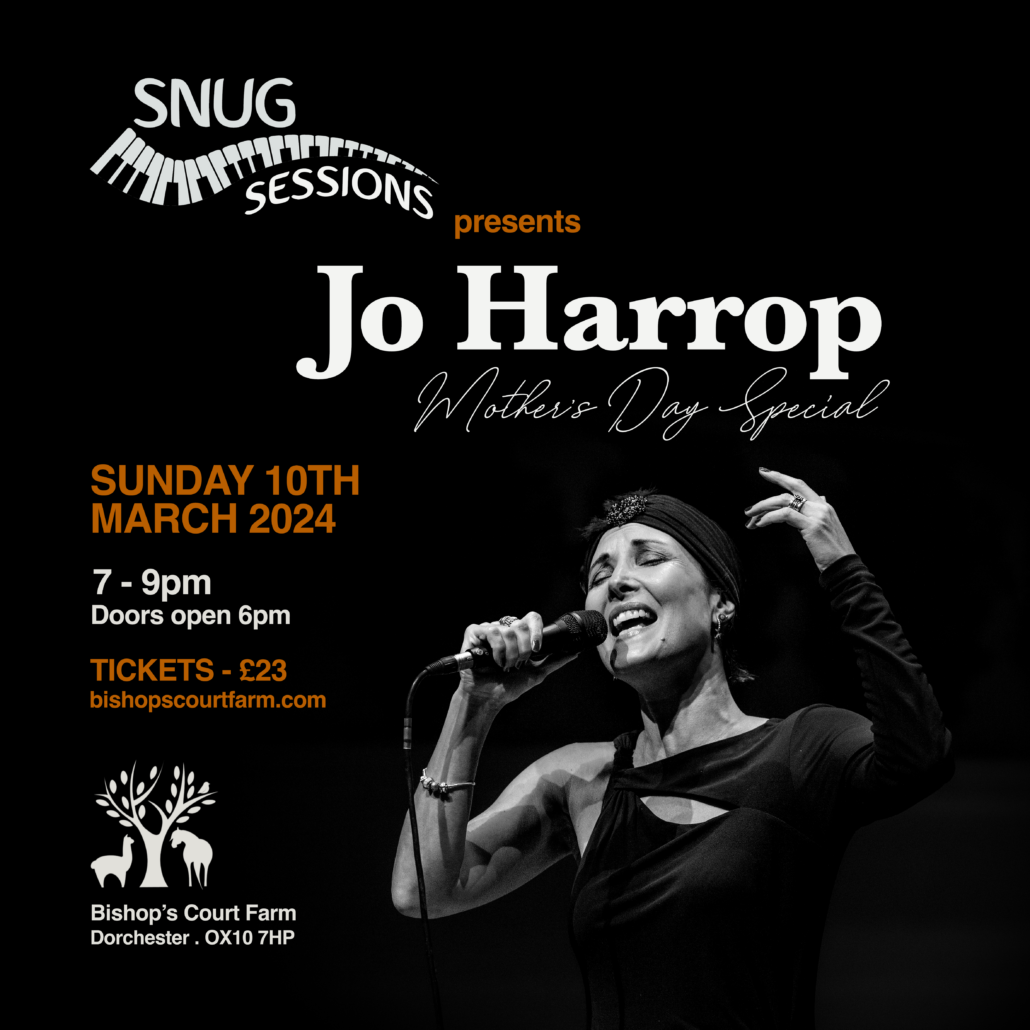
Jo Harrop ‘Mother’s Day Special’
in conjunction with
Hampstead Jazz Club
Bishop’s Court Farm
Dorchester on Thames OX10 7HP
Sunday 10 March
Doors 6pm | Show 7 – 9pm | £23
previewed by Jazz In Reading
Launching the 2024 Snug Sessions at Bishops Court Farm is Singer/Songwriter Jo Harrop. Having just returned from performing at Dizzy’s Jazz Club at the Lincoln Center in New York and SFJazz in San Francisco, Jo is most at home singing smokey torch songs at the piano, and there’s no finer pianist to accompany her, than her MD/pianist Paul Edis together with a stellar band.
Jo will be performing songs that touch on the idea of nature and the trials and tribulations of the heart alongside a healthy twist of material to celebrate Mother’s Day.
Songs taken from her catalogue of albums Weathering The Storm, The Heart Wants, and When Winter Turns To Spring. She will also unveil some songs taken from her highly-anticipated new studio album recorded at The Village Studios, Los Angeles, with legendary producer, Larry Klein, best known for his award-winning work with a long list of iconic artists that includes Joni Mitchell, Madeleine Peyroux and Herbie Hancock.

Jazz On Air
HOT BISCUITS
delivered to your home by Steve Bewick

I know there ar many fans of live jazz music amongst PASS IT ON readers who also listen to Hot Biscuits. So why not bec ome a fan of live jazz yourself. If you tunbe in to our mix cloud edition this week, I´m sure you´ll find something to enjoy. So join me at the Hot Biscuits Jazz podcast 24/07 this week with the Phil Shotton Quartet and a selection from Dexter Gordon aka The Mr. Jazz
You will also discover a new sound from QOW TRIO. and we will play two enticing versions of Embraceable You but by whom,…can you guess?
Also included is an introduction to jazz tap with a duo of Petra Haller, dancer with Meg Morley, piano. I finish with an echo ofSteely Dan, ond I´m pleased to see them included in today´s edition of PASS IT ON. The arrangement I shall be playing is of their track, Josie, but in a version arrangemed from the Gloucestershire Youth Jazz Orchestra.
If this sounds good, pass it on and follow me at
MIXCLOUD:COM


Music in Porstmouth
Live Music
CLARINET QUARTET,
Keir Rowe, Bogdan Vacarescu, Michael Sullivan, Phyllida Maude-Roxby, & Nigel McNestrie
Chichester Cathedral, February 13th 2024
review in newsletter by David Green

The Clarinet is a bubbly thing, isn’t it. It is a character actor like the bassoon or trombone. Clarinet Quintet aren’t five of them, though. They are Keir Rowe with a string quartet, a West Sussex Chamber Ensemble possibly in search of a better name. Hopefully one even better than the West Sussex Chamber Ensemble.
Mozart’s Quintet K. 581 begins on a summer’s day, one can’t help but think, with smooth clarinet and strings. The Larghetto then equally brings to mind the famous Concerto, creamy with Bogdan Vacarescu’s (left) gorgeous interpolations. There is all the dancefloor etiquette of the Minuet’s genteel sashay before the Allegretto finale did then bubble and tripped through its variazoni of tempi and theme.
String Quartets are something we don’t get enough of round these parts. Either that or I’m not going to the right places. The Mozart Divertimento K. 136 had Bogdan leading a light breeze in the Allegro and the Andante was all grace and consolation with Phyllida Maude-Roxby, viola, and Nigel McNestrie, cello, having neat contributions to make and Michael Sullivan more than ‘second fiddle’ and the order and sanity that Mozart brings into the chaos of how the world is now and maybe always has been was completed with precision that the quartet made look easy in a happy Presto.
After three hours of music and music talk only last night I had wondered how much more I needed so soon but of course one wants such things, short of being addicted to it. We are routinely spolit by Chichester Cathedral’s lunchtime concerts but I, for one, can’t see any harm in it.
review by David Green
Pictured: Bogdan Vacarescu
More Live Music in Portsmouth

Profile: Rebecca McNought, Cello
Rebecca will be playing the cello at the Festival Lunchtime Recital on Tuesday, March 19th at 1pm in St Peter’s Church.
What are you looking forward to most when performing at the Petersfield Musical Festival this year?
I spent a long time with Emily Hoh, my amazing pianist, discussing a programme that we felt reflected our personalities and our musical influences the best, so I am really excited to see this programme pulled together. It consists of three very different 20th century works, with three very different characters, so switching between these moods and atmospheres is the fun (and challenging!) part of this kind of repertoire. It’s also great to be performing works (such as the Macmillan and the Boulanger) which are not so regularly heard within recital settings – knowing much of the audience is hearing a piece for the first time pushes me to really explore the piece in as full a sense as possible.
Who and/or what have been the most important influences on your musical career?
All of my wonderful teachers, which I have been so lucky to work with and have had guidance from over the years. My first teacher, Robina Sabourin, I had for 10 years and she set me up with a real passion for playing. Emma Denton then started to ask the difficult questions and allow me to explore outside of my comfort zone. Then when I was at the Academy, I was so lucky to learn with Hannah Roberts, who has supported me into the step from student to professional with such care and compassion.
What have been the greatest challenges of your musical career so far?
I graduated from my Professional Diploma in 2020, therefore attempting to launch a career into an empty space where all musicians were struggling to understand what the best pathway could be for them. I also had to give back the amazing cello I had been borrowing from the RAM, and cello shopping at that time was not an option! It took a few months for me to reframe what my next steps would be, and how to make things work. I am very grateful to the Michael Hurd Fund for supporting my purchase of my current cello, as this instrument allowed me to continue seeing a path forward within the music industry.
What for you are the particular pleasures and challenges of collaborating with other musicians?
Collaborative music making is my favourite way of making music because it allows us to become more adaptable, to continue to learn from each other, and to share ideas. Whilst individual practice time is very important, I find I am able to explore my ideas more fully when I am working with a chamber group. Of course, the challenge is then agreeing on which ideas to implement!
Are there any composers for whom you feel a particular affinity?
I can’t not say Elgar – his concerto has been in my repertoire since I was a teenager and it has taken me on so many journeys. I’ve spent the last few years exploring more and more 20th century repertoire, hence my entire programme being from that century at this festival!
What are your most memorable concert experiences, either as a performer, composer or listener?
As a listener, I was watching a trio concert recently where the performers ended with an encore of La Vie En Rose – it was such an exquisitely formed arrangement that you felt like the only person in the audience. Any concert with an intimately set encore I find very moving.
As a performer, my last concert before lockdown was a cello ensemble concert at Queen Elizabeth Hall with Guy Johnston and Sheku Kanneh-Mason. I will be forever stuck in my memory as it felt so poignant – we were only a few days off schools shutting, and, despite the concert being a sell-out, we ended up playing to only a half-capacity audience. However, it felt like the most enormous out-pouring of love for music, and especially for live music!
What advice would you give to those who are considering a career in music?
The key for me would be that it is ok not to be sure exactly what you want to do. I’ve spent the last few years chatting to mentors who have had incredibly successful careers, but who have changed path multiple times within that. It’s ok to try things out, and found out what works for you. We are taught about “portfolio careers” at conservatoire, building lots of different strands together such as orchestral work, teaching, solo performance etc. It feels scary to be balancing all these different aspects, but ultimately that’s what makes it such a fulfilling career.
How would you define success as a musician?
Success for me personally, is being able to do what I love and still be able to pay my bills! It is also being free to self-analyse where you want change within your life, and having the confidence to make that change.
What would you like to be doing in 5 years’ time?
I’m at a huge crossroads in my life right now, as I’m about to start my new job in the Bournemouth Symphony Orchestra – my first full-time orchestral job – so looking ahead to 2029 feels a bit terrifying. I’d like to be doing much the same – balancing orchestral work with still playing some solo and chamber music concerts, and keeping my education work alive.
Rebecca McNaught is a dynamic young British cellist who has performed internationally as a soloist and orchestral musician. In 2024 she began a full-time position in the Bournemouth Symphony Orchestra, performing across the south-west, whilst continuing to perform as a solo and chamber musician around a busy orchestral schedule.
She is especially passionate about Elgar’s Cello Concerto, which she has performed across the UK at Merton College’s Passiontide Festival, St. John Smith’s Square, Gloucester Cathedral and in Tewkesbury Abbey.
She completed her Professional Diploma in 2020 at the Royal Academy of Music where she explored post-romantic solo and duo sonatas by composers such as Britten, Hindemith, and Crumb, under the tutelage of Hannah Roberts. Performances of this repertoire included at the Two Moors Festival, Knighton and District Concert Series, and in Guildford Cathedral.
She graduated with a Regency Award for distinguished studentship, along with the Vivien Joseph Postgraduate Cello Scholarship and the Rhoda Butt Award. Before starting at the BSO, she has been working as a freelance musician, recording with the Manchester Camerata, in a cello ensemble with Sheku Kanneh-Mason, and as a soloist at Milton Keynes International Festival.
Born in Cheltenham to a home alive with classical music, Rebecca began learning the piano at a very young age, and, although the piano remained a big part of her upbringing, it was the cello that became her focus and she has been playing now for twenty years
Drawn to both academic and practical music, Rebecca studied for a BA in Music at Merton College, Oxford University where she obtained a first-class degree. Alongside her studies, she explored a wide variety of chamber music, and performed the Mozart and Brahms Clarinet Quintets with the Holywell Quintet at St. Martin-in-the-Fields, London, and the Holywell Music Rooms, Oxford.
During her Masters at the Royal Academy of Music, she continued to enjoy expanding as a chamber musician. At Cowbridge Music Festival, Rebecca participated in the Chamber Seminar Week, where she performed Kodaly’s Duo for Violin and Cello with Elena Urioste, and Mendelssohn’s C minor Piano Trio, with pianist Tom Poster.
During her Masters, Rebecca performed as principal cello of the Academy Symphony Orchestra, including in Shostakovich Symphonies 8 and 10, Bruckner Symphony 4 and Rachmaninov Symphonic Dances with conductors Sir Mark Elder, John Wilson, Robert Trevino and Edward Gardner, and performed at the BBC Proms 2019 in The Rite of Spring with Edward Gardner.
She also toured Japan in June 2018 with the Academy Chamber Orchestra under Trevor Pinnock, taking Beethoven and Mozart to locations in Tokyo and Koriyama. Earlier that same month, she was privileged to participate in the Kyoto International Music Student’s Festival, exploring a different region of Japan. She performed solo repertoire by Schumann and Chopin with pianist Richard Gowers, as well as uniting with musicians from ten different countries from around the world in chamber music and as principal cellist in the orchestra. She also enjoyed expanding her outreach work as an Open Academy Fellow, and has created accessible concerts for people living with dementia in the Wigmore Hall and Leighton House, providing varied programmes of short works and spoken information for the audience.
Education and learning participation work has always been an enormous part of Rebecca’s musical output. She feels very lucky to have created a groundbreaking new pathway whilst working as Music Partnerships Coordinator at Westminster School, bringing music to the wider community of Westminster, and introducing the students to different ways in which music can become more accessible. She also worked as Head of Strings at King Edward’s School, Witley & Barrow Hills School, and as a cello and chamber music tutor at the Royal College of Music Junior Department before she began the role at the BSO.
You can find out more if you visit her website..


Remembered Music
AL BOWLLY´S DEAD
by Ralph Dent
This week I have been looking down through space, because I like to swing on a star until I reach my nightly hiding place, just on the dark side of the moon. From there I like to look down on the diaspora of the Warwick family to see how my sons, Norman his wife Dee, and his brother, Graham, and my grandson, Andrew, in South Korea with his wife Sue and my grand-daughter, Olivia. Peering through the mists of time I spotted Norman on Spotify making a playlist that I assumed would be full of that Americana rubbish that he seems to love so much. You could have knocked me down with a feather, though, when I noticed some of the artists he was placing on a twenty track compilation.

It seems to me that Spotify have even more music than Leonard Cohen (left) ever had in his Tower Of Song, Of course, up here over the rainbow, we have music to last for ever, what with the harps and the sounds of the angel wings. Nevertheless I was surprised at the music my son was able to extract, even if the artists listed were far removed from his usual Americana fare.

I could hardly believe what I was reading, as he typed in the name of Hoagy Carmichael (right) singing about all the Stardust we have up here and also about Lazy Bones, my next door neighbour when I lived down there, How was Hoagy claiming two tracks on one of my son´s playlists or whatever they´re called?
There were other wonderful artists surrounding Hoagy.
Fred Astaire and Ella Fitzgerald were there while Andy Williams paddled down Moon River to claim his place. As soon as he found out Ruth Etting was charging ten cents a dance Bing Crosby started asking Buddy Can You Spare A Dime.

When Steve Bewick, jazz radio presenter started baking his Hot Biscuits to complement the Java Jive of The Ink Spots, (left) I was beginning to realise I didn´t know what a mix-cloud is and I was going to be late back for supper. St. Peter would give me a good old telling off for sure. I would have to hide behind a laurel tree and sneak in through the pearly gates when the Saints Go Marching In.
But I was puzzled by what my son was up to. He might have known these great singers through listening to me singing their songs as I used drive him around from football match to cricket match where he was invariably an unused substitute.

I was surprised he remembered any of the names I´ve just mentioned to be honest, but there was one name, from even just a bit before my time ! Al Bowlly was one of my my favourite artists, with a beautiful voice and he was selector and interpreter of song. So on top of this list, wearily called Old Before My Time, was the name of Al Bowlly.
Albert Allick Bowlly (7 January 1898 – 17 April 1941) was a South African-British vocalist and jazz guitarist who was popular during the 1930s in Britain. He recorded upwards of 1,000 songs.
His most popular songs include “Midnight, the Stars and You“, “Goodnight, Sweetheart“, “Close Your Eyes“, “The Very Thought of You“, “Guilty”, “Heartaches” and “Love Is The Sweetest Thing“. He also recorded the only English version of “Dark Eyes” by Adalgiso Ferraris, as “Black Eyes”, with the words of Albert Mellor.
After a series of odd jobs in South Africa, including barber and jockey, he sang in a dance band led by Edgar Adeler on a tour of South Africa, Rhodesia, India and the Dutch East Indies during the mid-1920s. His main role was as guitarist. He was fired from the band in Soerabaja, Dutch East Indies.
Jimmy Lequime hired Bowlly to sing with his band in India and Singapore. When he left Lequime, it was with the pianist Monia Liter, the two of them travelling to Germany, where they played with Arthur Briggs and his Savoy Syncopators, Fred Bird’s Salon Symphonic Jazz Band, and George Carhart’s New Yorkers Jazz Orchestra. In 1927 Bowlly made his first record, a cover version of “Blue Skies” by Irving Berlin that was recorded with Adeler in Berlin, Germany. During the next year, he worked in London, with the orchestra of Fred Elizalde.
He moved to Britain, where in July 1928 he joined Fred Elizalde’s band that played at the Savoy Hotel, London until 1930. He went on to play with various bands on a temporary basis, before gaining more regular employment in May 1931 with Roy Fox, singing in his live band for the Monseigneur Restaurant, a stylish restaurant on Piccadilly in London, and later with bandleader Ray Noble in November 1930.
During the next four years, he recorded over 500 songs. By 1933, Lew Stone had ousted Fox as the Monseigneur’s bandleader and Bowlly was singing Stone’s arrangements with Stone’s band. After much radio exposure and a successful British tour with Stone, Bowlly was inundated with demands for appearances and gigs – including undertaking a solo British tour – but continued to make most of his recordings with Noble. There was considerable competition between Noble and Stone for Bowlly’s time. For much of the year, Bowlly spent the day in the recording studio with Noble’s band, rehearsing and recording, then the evening with Stone’s band at the Monseigneur. Many of these recordings with Noble were issued in the United States by Victor, which meant that by the time Noble and Bowlly came to America, their reputation had preceded them.
Bowlly performed in England with his band, the Radio City Rhythm Makers. By 1937, the band had broken up when vocal problems were traced to a wart in his throat, briefly causing him to lose his voice. Separated from his wife and with his band dissolved, he borrowed money from friends and travelled to New York City for surgery.

His absence from the UK in the early 1930s damaged his popularity with British audiences, despite his association with pianist Monia Liter as his accompanist. His career began to suffer as a result of problems with his voice, which affected the frequency of his recordings.He played a few small parts in films, but the parts were often cut and scenes that were shown were brief. Noble was offered a role in Hollywood, although the offer excluded Bowlly because a singer had already been hired. Bowlly moved back to London with his wife Marjie in January 1937.
With diminished success in Britain, he toured regional theatres and recorded as often as possible to make a living, moving from orchestra to orchestra, working with Sydney Lipton, Geraldo and Ken “Snakehips” Johnson. In 1940, there was a revival of interest in his career when he worked in a duo with Jimmy Messene in Radio Stars with Two Guitars on the London stage. It was his last venture before his death in April 1941. The partnership was uneasy; Messene was an alcoholic and he was occasionally unable to perform. Bowlly recorded his last song two weeks before his death. It was a duet with Messene of Irving Berlin’s satirical song about Hitler, “When That Man Is Dead and Gone”.
Al Bowlly’s cover songs have been widely included in other forms of media. The Caretaker, who sampled Bowlly’s music for his Everywhere at the End of Time series of albums from 2016 to 2019, has said the public believed that if Bowlly had not died during the war, he would have been “bigger than Bing Crosby,” and that “he had a better voice.”
Dennis Potter´s television play Moonlight On The Highway, first broadcast in the UK on 12 April 1969, focused on a young Al Bowlly’s obsessive attempting to blot out memories of sexual abuse via his fixation with the singer. Potter later featured Bowlly’s music in Pennies from Heaven (1978).
Bowlly was mentioned and his songs were used throughout the first few series of the British TV comedy Goodnight Sweetheart.
Bowlly’s rendition of “Midnight, The Stars And You” has been particularly used and referenced throughout varied films, appearing in The Shining, Toy Story 4, and Ready Player One. Some commentators specifically highlight its use in The Shining‘s ending scene, with HeadStuff‘s Luka Vukos calling it “haunting” and Screen Rant praising it as “one of the most unforgettable final shots in movie history.” The song has also been used in the 2013 video game BioShock Infinite: Burial at Sea and sampled by musician Leyland Kirby on the Caretaker‘s Shining-inspired album Selected Memories from the Haunted Ballroom.
Richard Thompson wrote a song called “Al Bowlly’s In Heaven” (aka Al Bowlly´s Dead) included on his album Daring Adventures released in 1986. The critics of that era loved it. The track had jazzy music complete with double bass, at a considered pace as well as stunning, story-telling lyrics and crystal clear, powerful vocals. A great bluesy guitar solo right through the middle where it seemed the strings of his guitar were almost pressed right up next a listening ear.

I can´t remember Richard Thompson at all, although I would guess my lad would have made great claims for his music.
I´ve checked the register here for the name of Richard Thompson, and even checked the names of all the members of The Heavenly Choir, but I can´t find him there either.
I do remember now that my son, many years ago, was working on an episodic tome called Their Names Fell Out In Conversation, being all about songs which lauded musicians and music.
It seems he´s still following that path, but I told him he´d never get anywhere by writing for a living.
If you were down here with me now dad, I would remind you that I have been writing since I was twenty one, and I´m seventy one now. I´ve been writing for fifty years.
And I was right, you never got anywhere by writing for a living !


A Reader´s Perspective: All Points Forward
TEN SONGS by Ben Bullington
a profile by Peter Pearson
Darrel Scott, the highly respected Americana singer songwriter and one of my favourites, released his 2015 album titled 10 Songs By Ben Bullington. On hearing the album and having never before heard of Ben Bullington, I made it my business to find out more about him.
In the album liner notes Darrell Scott says ” My wish is for you to slow down for 52 minutes. I believe there is pure beauty here. These songs are perfect examples of song as literature. Ben’s songs are timeless. I loved getting right in the middle of these songs and offering my best. These are great songs: period.”
Great songs they are but why had I not heard of him before?
The answer lies in the fact that he was first and foremost a hospital doctor in a small town and lived and performed his songs in an even smaller town. He wrote his songs in his spare time and even between breaks from his shifts in the hospital. He also kept a very low profile and in his song writing and performance career worked alone. He was a guitar geek and had a knack for finding vintage instruments in great disrepair and then restoring them.
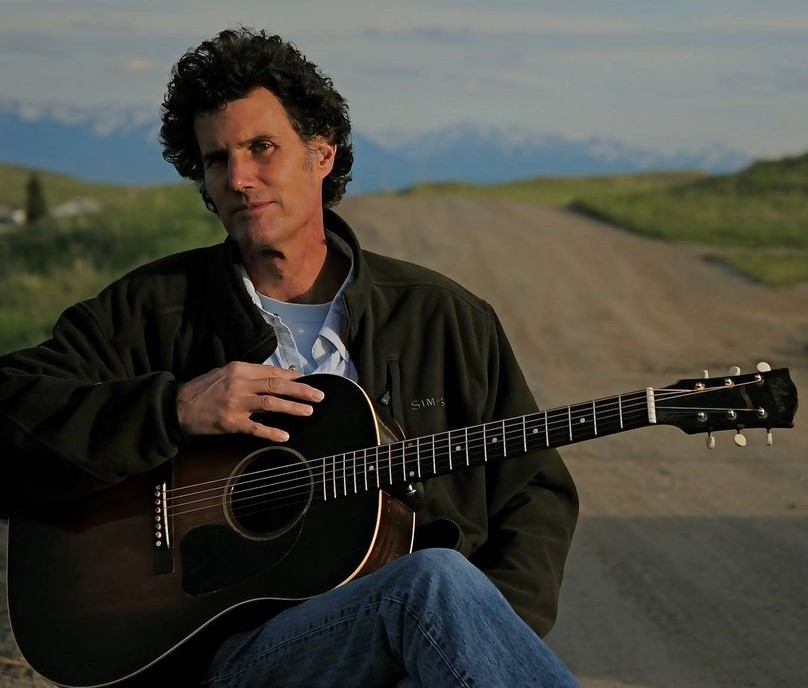
Ben (right) was born in 1955, the middle of five children, in the small city of Roanoke, Virginia, USA. His love of music started in high school when he bought a guitar and took lessons. His brother, Andy, was to become a professional musician and sideman, later playing guitars on Ben’s albums, but Ben took a different route to becoming a singer songwriter.
Attending college in Nashville and studying for a geology degree, he was also introduced to the music of the great songwriters who populated the Nashville music scene.
There followed a brief period in the oilfields before deciding to go into medicine.
After studying at medical school he started a family and practiced medicine on a Cheyenne reservation in Montana. In 1996 he took a job at a small hospital in White Sulphur Springs, Montana. As his boy’s got older he started writing songs in the quiet early morning hours and in 2007 self issued his first album, Two Lane Highway, produced by Sean Devine of Livingston, Montana. Devine was himself a singer songwriter and encouraged Ben to perform at local venues. “Sean was extremely generous and helpful to me. He’s a great musician and a great listener.” said Ben.
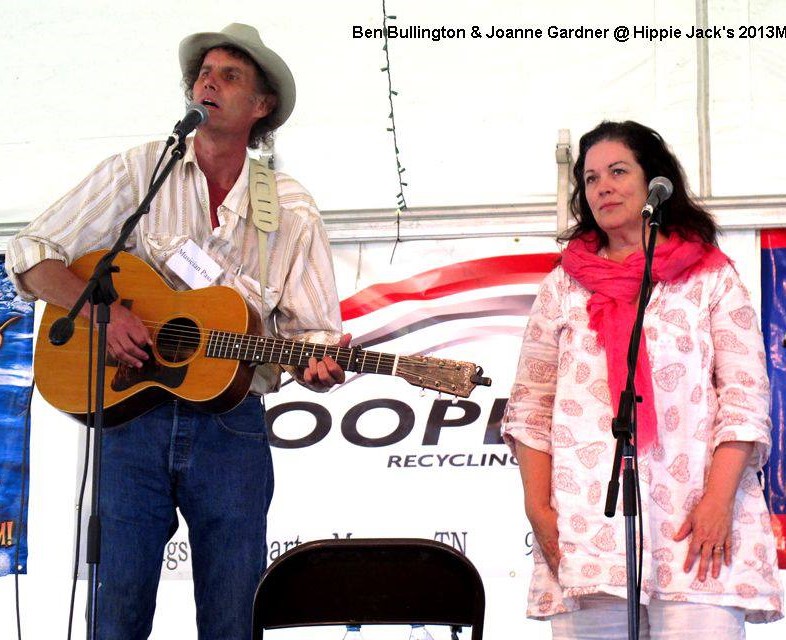
It was Joanne Gardner (left, with Ben) who later became his manager who brought Ben to the attention of a wider audience.
Joanne Gardner, then based in Nashville, co-founded a production company called ACME Pictures with Rosanne Cash before becoming an executive at Sony Corporation, where she made music videos for stars like Bob Dylan and Will Smith. Gardner was still managing Rodney Crowell when she moved to Livingston, Montana in search of a quieter life and in 2007 met Ben Bullington at a dinner party and became firm friends.
Gardner introduced Bullington to Rodney Crowell who played on and helped produce Bullington’s second album in 2008, White Sulphur Springs. The third track on the album, Toe the Line, features a duet between the two.
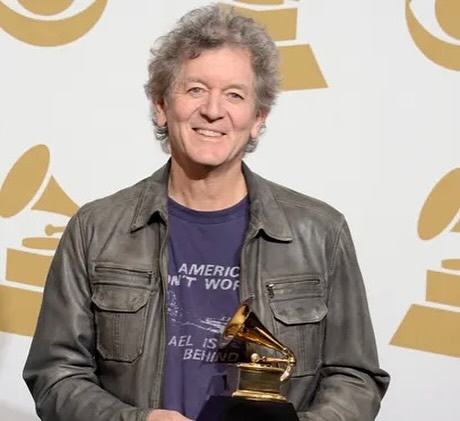
Rodney Crowell (right) also produced two tracks on Bullington’s next album, Satisfaction Garage, in 2010, and dedicated the opening song, The Long Journey Home on 2014´s, Tarpaper Sky, to him.
In spite of releasing three albums Ben was still continuing with his day job in medicine, writing songs and playing festivals.
In 2012 he was diagnosed with terminal cancer and decided to devote his remaining time wholly to music. Two further albums followed, Lazy Moon in 2012 and Ben Bullington in 2013. During this time he continued to play gigs, accompanied on vocal by Joanne Gardner, who also performed driving duties.
I said earlier on that he worked alone in his song-writing and performing but the five albums that he released deserve scrutiny and certainly a greater audience.
His first album,Two Lane Highway, in 2007 is described by Joanne Gardner as being a kitchen table production and was recorded in Livingston, Montana, with the help of local musicians.
Once Rodney Crowell was brought on board, if one looks at the album details and credits, everything changes. The second album, White Sulphur Springs in 2008, shows the following personnel:
Ben Bullington: guitar and vocals
Fats Kaplin: pedal steel, violin, mandolin, accordian
George Bradfute: bass, electric guitars, cello
Joanne Gardner: vocals
Tracy Nelson: vocals on I’m a Stranger
Michael Johnson: nylon string guitar on Come To Me
Rodney Crowell: vocals and resophonic guitar on Toe the Line
These are Nashville royalty and the album was recorded and mastered in Tennessee. The duet with Rodney Crowell on Toe The Line is as fine as any on Rodney’s records. But Ben was still principally a doctor and, in line with his medical commitments, only toured locally.
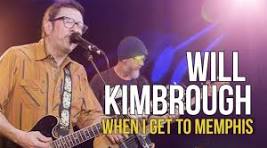
Satisfaction Garage in 2010 follows a similar pattern. More of Nashville royalty are added to the roster: Kenny Malone on percussion, Will Kimbrough (left) on guitar and Dave Jacques on bass. These are the sidemen that appear on John Prine and Emmylou Harris albums. The quality of Ben’s songwriting is more than a match for this kind of support.
Lazy Moon 2012 is back to recording in Montana but the cast is joined by Bill Payne of Little Feat, by then a Montana resident.
By the final album, 2013 Ben Bullington, Ben had received his cancer diagnosis and had relinquished his day job for full time music making. During my research for this profile I have had to piece it together from fragments from various sources as there are no books or long articles which cover the detail. I found that the following album liner notes with Ben’s own words, that accompany the album, say it best:
Bullington’s previous releases have garnered attention from some of music’s most prominent voices. Until recently, Ben Bullington was a doctor in a small hospital in Southwest Montana. Legendary songwriter Rodney Crowell has said of Bullington, “Ben Bullington’s work draws life-breath from the earth, rivers, sky and people of Montana. In the same way Guy Clark’s jeweler’s vision captures the eloquent essence of Texas culture without being regional, Ben frames the stillness of Montana winters, the strength of her women and the spiritual bankruptcy of no-account politicians with disarming ease.”
“Plus,” Crowell adds, “the guy’s a pretty damn good doctor for a songwriter.”
In Bullington’s own words, here is a listing of the tracks off the latest release.
“Appalachian Mtn Delta Blues”: It’s probably my most autobiographical song to date.
Men who can live off the land in a post-apocalyptic world are evoked in “Maybe There’s A Future For A Cowboy.”
“Country Music (I’m Talkin to You)” takes a jab at the glitzy pop-country mainstream.
“His Chosen Time”: A song about a coal mine disaster in Utah falsely attributed by its owner to an earthquake. My dear friend Joanne Gardner nails the back up vocal.
“I’ve Got to Leave You Now” was written to my sons, two or three years ago. Maybe it’s a premonition song: I got diagnosed with a bad cancer last fall.
“Here’s to Hopin'”: Ruminations on the future of mankind and life on earth. Mary Chapin Carpenter lent the gravitational pull of her vocal gift to this one. Wow. Thanks, Chapin.
I nearly came out of my chair when a good friend of mine told me she had once been a Jehovah’s Witness. Then I wrote, “The Wildest Girl I Know.”
“Heartbreak in Your Arms,” “The Daily Bleed” and “Wild Oats” explore the risks and possibilities of love.
Bill Payne brought the hook, “The Last Adios” to me and told me it was about his songwriter friend Stephen Bruton, with Richie Hayward in mind, too. He had some notes and we wrote this song together.
Ben Bullington died of pancreatic cancer on November 18th 2013 at age 58. During his last days he was cared for at the home of Joanne Gardner in Livingston, Montana and visited by many of the great songwriters. Mary Chapin Carpenter was one of those visitors. She had become a friend and worked with him on his last album. The story of her road trip to see him is recounted in her song, Livingston, featured on her album,The Things That We Are Made Of (there is also a song called Livingston on Ben’s Lazy Moon album but the song is entirely different).
All Ben’s albums are no -label productions and are hard to find, though still available on his website. However he can be heard on Spotify, amongst other streaming sites. Darrell Scott’s 10 Songs album is more readily available, though a heavily condensed version of Ben’s songwriting. This is the story behind it:
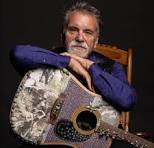
Darrell Scott (right) first met Bullington at a songwriters camp some years earlier when they bonded not as songwriters initially but as divorced fathers with children at the camp who together encountered a grizzly bear whilst out trekking. They did not trade songs at the camp and it was not until the last year of Ben’s life that Scott heard his songs.
On Bullington’s bucket list was a Nashville songwriters round, which he did with Will Kimbrough, Crowell and Scott. It was there that Scott began to hear Bullington’s songs and was mightily impressed.
Darrell Scott issued his album, 10 Songs By Ben Bullington, in 2015 but it was conceived during the last year of Ben’s life.
During the last three months of Ben Bullington’s life, Scott began sending him iPhone recordings of his own versions of several Bullington tunes.
The first iPhone recording, I’ve Gotta Leave You Now, closes the album and was written by Ben following his diagnosis.
Darrell Scott said: “This recording is what Ben heard and he loved it. What I wanted was for Ben to hear his songs coming toward him rather than only from him.”
It is a fine album, an excellent introduction to Ben Bullington’s music,and a fitting tribute to a man that faced death with dignity whilst devoting his life to medicine and music.


Island Insights
AJ the DJ enjoys PHOENIX NIGHTS
by Norman Warwick

Aileen AJ THE DJ Hendry is an informed, informative, inquisitive and empathetic radio host at Monster Radio, based in Tias here on Lanzarote. She was one of the first people I got to know when I came to live here in 2015, when I joined The Lanzarote Creative Writing Group and found myself sitting alongside Aileen and, before knowing anything of her radio work, I learned that she is a fine writer with an acute sense of location and is an excellent judge of character, whether that ´character´ be a goodie or a baddie in her work. Her use of dialogue is excellent and she has a good ear for accent and dialect appropriate for the settings of her stories.
The Perfect Storm is a superbly versatile title of the programme she created and now presents. The broadcast itself carries all the conditions of a perfect storm as AJ, as I call her when we are in rock n roll mode, is always prepared for her weekly programmes having studied the backgrounds of her guests, and in a lively, chatty manner she ensures that her audience will be made aware of the background knowledge to the conversation they hear over a two hour deliberation. I mentioned that she is inquisitive and if she wants to know the answer to something she will not shy away from asking the question, but is always empathetic and courteous to her guests. I know this to be true because I have twice been her guest. She lured me in, as I´m sure she has lured most of her guests, with the promise that I could select my own track list with which to colour our chat.
Come on readers, you know I can´t resist a playlist !
On the first occasion AJ focussed on my song-writing career and spoke about the three albums of self penned material that my mate Colin Lever and I recorded under the name of Lendanear in the nineteen seventies.
I explained that our debut collection, Moonbeam Dancing, was a selection of our songs that we turned into an autobiographical album, and that our second was a live performance of that album. AJ also asked about Lendanear´s third and final album, Songs For Sarah and I explained that this collection of seven new songs and one cover version of a Curved Air song told a factual and fictional ´true´ story of the murder of a friend of mine in Manchester.
As I was speaking to AJ I seemed to forget that I was live on air and that I had never revealed the meaning of this album to anyone but Colin.
And that is AJ´s great strength she brings all the elements of creativity together with direct questions that a guest finds himself revealing things to the audience, and perhaps even to himself, that had previously lain hidden.
It also takes a Perfect Storm to be created for an artist to become successful, famous and identifiable. There has to be an opportunity, demand, an acceptance all to be aligned for an artist to break through. Most of AJ´s guests have made the most of those Perfect Storms and are already established cultural icons. Others, like myself reach a point in AJ´s very gentle interrogation at which they can identify a point when all the weather conditions of a Perfect Storm were presenting an opportunity that they could not maximise.
In a second interview by AJ, a couple of years later, in which she focussed on what Perfect Storm might have made my subsequent writing career as a poet and author more successful than my earlier song-writing career. How enlightening that might have been for the audience I am not sure, but what I know now is that the programme made me re-define for myself about what should be considered a success.
And I guess that John Stewart was right when he hoped not for fame and wealth and the trappings of commercial success, but instead hoped that ´even when I´m gone, maybe some lonesome picker will find some healing in these songs´.
Since then I have heard AJ conduct more probing interviews with famous stars (ones with Sharron Shannon and Suzi Quatro stand out) and recently I received an e mail from AJ saying I should tune in to this week´s programme.

AJ said ´Hi Norm, have a listen to Toni Baker. What a talented guest. Great stories of a life well lived in the music industry and a cracking playlist including hits from The Walker Brothers, Heatwave, Shabby Tiger, Steely Dan and Joe Walsh. His book is out now too.´
Although I haven´t had a chance to do so as yet, I promise our readers I will soon be placing a major piece in Sidetracks And Detours about this edition of The Perfect Storm.
Toni Baker has been in the professional music industry since 1968 and since 1972 he has played on many recordings as a session player. In the 80s Toni was involved in recording advertising jingles and composing original music for background music companies.
As a PRS and BASCA member, he has, over the years, been responsible for co-writing, recording and producing all the original music and cover songs for Peter Kay’s “Phoenix Nights” Series 1 and 2,“Max and Paddy’s Road to Nowhere” and “The Power of Two” workout DVD.
Toni´s clients have included Granada TV, Channel 4
and Phil McIntyre TV
He has worked on shows such as
“Phoenix Nights”
“Max and Paddy’s Road to Nowhere”
“That Peter Kay Thing”
Peter Kay’s “Mum Wants a Bungalow” live theatre tour
“Bottom – Mindless Violence” live theatre tour
“League of Gentlemen Are Behind You” live theatre tour
“Power of Two” Max and Paddy Workout DVD
“Early Doors”
“Thin Ice”
“The Unknown Stuntman”
“Paddy McGuinness Live”
“Waterloo Road”
As well as writing and recording music today, Toni Baker also performed live with 60s Hit Recording Band, The Dakotas and he has worked with many artistes and musicians over the years, both live and in the recording studio.
These include Peter Kay, Tony Christie, League of Gentlemen, Billy Ocean, Sheena Easton, The Miracles, Brenda Holloway, Barry Ryan, Peter Noone, Lisa Stansfield and The Walker Bros.
There must be many fascinating tales he had to share with Aileen AJ the DJ Hendry so be sure we will also bring you a review of Toni Baker´s new book recounting his remarkable career.


We return with our Sidetracks and Detours Monday to Friday not-for-profit blog tomorrow Monday 19th February and on our itinerary next week we are sure to be Into Something Good when we meet up with friends Stateside to discuss what American music they found to their liking last year. Then we return to Lanzarote to learn from six chamber music musicians from England and learn about the three composers they selected to play for their performance in the fortieth annual International Classical Music Festival Of The Canary Islands. We´re back to America to meet Wilco´s long lost Cousin before having to return to Lanzarote the following day to hear Musical Folk Lore Travelling Through Time And Space. We´ll be landing with a new book that is a collation of women writers talking about the women writers they themselves read. So, we´ll see you somewhere through those hills and gone.



Leave a Reply
Want to join the discussion?Feel free to contribute!